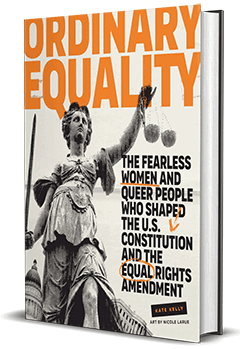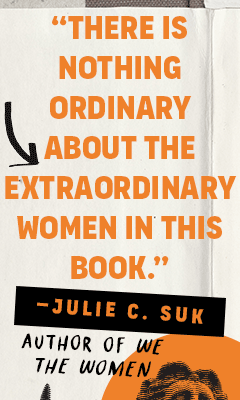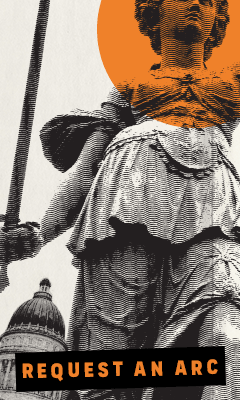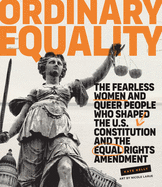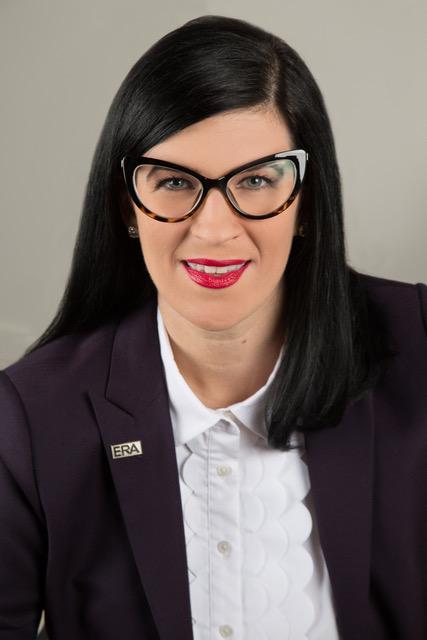Ordinary Equality
by Kate Kelly, illus. by Nicole Larue
Activist and lawyer Kate Kelly turns her keen eye to the history of the United States Constitution and Equal Rights Amendment (ERA) in Ordinary Equality: The Fearless Women and Queer People Who Shaped the U.S. Constitution and the Equal Rights Amendment. Kelly's passionate and personal take on the ERA's history serves to ground Ordinary Equality, reiterating that the Constitution and the ERA are not stale, irrelevant pieces of paper, but rather living, breathing documents that hold sway over the everyday lives of millions of people in the United States. From the beginnings of America to her own growing obsession with the ERA, Kelly explores the history of both charters within the context of the many women and queer folk who influenced the documents themselves as much as the political, social and cultural climate in which they were conceived.
The 35 men who drafted the Declaration of Independence "intentionally excluded the people around them," notes Kelly, focusing instead on the rights of white, land-owning males (estimated at that time to be just 5% of the population of the colonies that would become the United States). By refocusing her history on women and queer people--many of whom are also people of color--Kelly sheds light not only on the ways that the rights of these groups were purposefully left out of the Constitution, but how the stories told about the Constitution's drafting and adoption--and about the role of the ERA in its more recent history--have continued to ignore and overlook women, queer people and people of color. In the 12 chapters in Ordinary Equality, Kelly weaves together stories of Indigenous leaders like Iroquois Molly Brant and Cherokee Nancy Good, whom the Constitution's authors ignored; enslaved African women like Phillis Wheatley who spoke and wrote about equality and freedom; Abigail Adams, who fashioned herself "Mrs. President"; suffragettes who fought for women's right to vote; those like Crystal Eastman and Alice Paul, who went on to draft the original ERA; and political figures like Barbara Jordan, the first Black woman to serve in the Texas State Senate, and Pat Spearman, the first openly lesbian legislator in Nevada's history, both of whom are known as staunch advocates for equality throughout their political careers. The list of "visionaries" included here is, Kelly notes, by no means exclusive, but rather a sampling of stories that "should be celebrated, not erased."
Though not formally included in the book's table of contents, one of the many stories of the ERA that can--and should--be celebrated is Kelly's own: she recounts her gradual change of heart, coming from a staunchly anti-ERA Mormon family to become one of the amendment's strongest advocates as it continues its journey to ratification. "I went to my first ERA rally at the US Capitol in 2012," she recalls, "right as I was graduating law school, and I became ERA-obsessed. I wanted to find women like me, throughout history, who felt the same way. Women who believed passionately that equality had to be cemented into our most foundational legal document and wanted to make the country better--from the inside."
This is where Kelly's narrative skill ("I'm not a historian, I'm a storyteller," she writes in her introduction) comes into play; as co-host of the Ordinary Equality podcast and across every page of this book, Kelly breathes life into the history of women's fight for equality under the law, highlighting the larger-than-life figures who led with intention and passion in their own lifetimes.
With stunning page layouts and bold, colorful designs by graphic designer Nicole LaRue, Ordinary Equality is an antithesis to the dry, academic tone most often associated with constitutional law and history texts. This stylized approach, layering Kelly's words with historical graphics and highlighted pull quotes throughout, captures the out-loud spirit of the ERA itself, as well as that of the trailblazers who helped it along the way. Congress met in 2019 to discuss the ERA again for the first time in 36 years, nearly 100 years after the amendment was first drafted in 1923. While the history of the ERA is still a work in progress, Kelly insists that "we cannot allow one more generation to pass before we get the legal recognition we deserve in our country's blueprint." In that vein, Ordinary Equality is as much an invitation as it is a celebration, informing new generations of leaders about a past too often overlooked, and what that past can teach us about the future of the ERA--and beyond--as the "distinguished list" of those helping to frame the United States' legal system continues to expand. --Kerry McHugh



